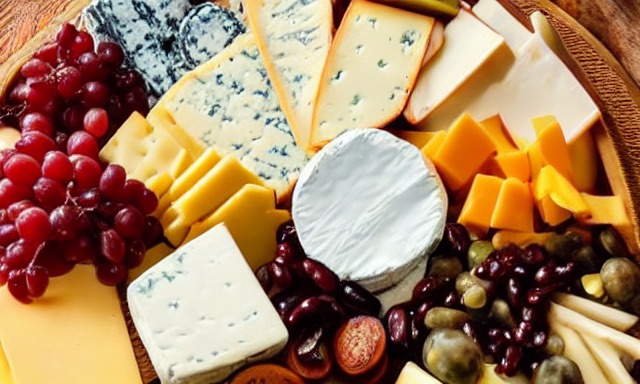Internet Asks: “Cheese Carbs”
Prepare to embark on a delectable journey into the world of cheese as we unveil the secrets of its carb content. Cheese, with its wide variety of flavors and textures, has been captivating taste buds for centuries. But for those keeping an eye on their carbohydrate intake, understanding the carb count of cheese is essential. So, let's dive into the cheesy abyss and discover the truth behind its carb content!
sponsored links

The Cheesy Delight
Cheese, a beloved dairy product, is made by coagulating milk and separating the whey. It comes in countless varieties, each with its unique characteristics and taste profiles. From creamy Brie to tangy Cheddar, there's a cheese to satisfy every palate. Cheese is not only enjoyed on its own but also used as a key ingredient in countless culinary creations.
The Carb Curiosity
When it comes to carbs in cheese, the levels can vary depending on the type and aging process. Generally, cheese is relatively low in carbohydrates due to the fermentation and aging processes that reduce lactose content. Most of the carbs in cheese come from lactose, a natural sugar found in milk. As cheese ages, the bacteria in the cheese break down the lactose, resulting in lower carb content. However, it's important to note that fresh cheeses tend to have slightly higher carb counts compared to aged varieties.
The Low-Carb Champions
For those on a low-carb quest, certain cheeses are the shining stars. These low-carb champions include:
- Parmesan: This Italian delight is not just a pasta topper but also a low-carb superstar, with almost negligible carb content. Grate it over your favorite dishes guilt-free!
- Brie: Creamy and indulgent, brie is relatively low in carbs, making it an elegant choice for your cheese platter.
- Gouda: The nutty and semi-hard gouda comes with low carb counts, making it a go-to option for snacking or sandwiches.
- Swiss: With its signature holes and mild taste, Swiss cheese is another low-carb contender, perfect for melting in keto-friendly recipes.
The Moderates of the Cheeseboard
Some cheeses fall into the moderate carb category, meaning they're not entirely low-carb, but a little goes a long way. These include:
- Cheddar: Sharp and versatile cheddar has a moderate carb content, so enjoy it in moderation to keep your carb goals on track.
- Blue Cheese: Known for its pungent taste and distinctive blue veins, blue cheese contains moderate carbs, making it a tangy addition to salads and dressings.
- Mozzarella: This stretchy favorite found on pizzas and in caprese salads has a moderate carb content, so portion control is the key.
sponsored links
The Higher Carb Connoisseurs
Some cheeses, while delicious, can be higher in carbs and may require careful consideration for those following strict low-carb diets. These include:
- Ricotta: Creamy and delightful, ricotta cheese has a few more carbs compared to other cheeses, so enjoy it mindfully.
- Cottage Cheese: Although a protein-packed snack, cottage cheese can have a slightly higher carb count, so be mindful of portion sizes.
Cheese, the Nutrient Powerhouse
Beyond its low carb content, cheese offers a host of nutritional benefits:
- High-Quality Protein: Cheese is an excellent source of high-quality protein, essential for muscle growth and repair.
- Calcium and Bone Health: Cheese is rich in calcium, contributing to strong bones and teeth.
- Vitamins and Minerals: Cheese contains essential nutrients like vitamin A, vitamin B12, phosphorus, and zinc, which play crucial roles in overall health.
Pairing Cheese with a Low Carb Lifestyle
For those following a low carb lifestyle, cheese can be a fantastic addition to your meals and snacks. Here are some fun and creative ways to enjoy cheese while keeping your carb count in check:
- Cheese and Veggie Snack Plate: Create a colorful and nutritious snack plate with a variety of cheese, sliced vegetables, and a dollop of guacamole or hummus.
- Cheesy Salad Toppers: Sprinkle grated Parmesan or crumbled feta cheese over your salads for added flavor and a protein boost.
- Cheese-Wrapped Delights: Wrap your favorite low carb vegetables or grilled chicken with thin slices of cheese for a tasty and satisfying meal.
Conclusion
In conclusion, cheese can be a delicious and versatile addition to your low carb lifestyle. While the carb content varies depending on the type of cheese, most options are relatively low in carbs. So go ahead, embrace the cheesy goodness and elevate your culinary experiences with the wide array of flavorful cheeses available. Just remember to enjoy it in moderation and savor every cheesy moment!
Disclaimer: The information provided in this article is for general informational purposes only and should not be considered as professional advice. The carb content of specific cheese types may vary, and it's essential to read product labels or consult with a qualified healthcare professional for accurate carb counting.
sponsored links
References
- USDA. FoodData Central. https://fdc.nal.usda.gov/fdc-app.html#/
- Medicine Net. Which Cheeses Are Lowest in Carbs and Is It OK To Eat on Keto Diet?. https://www.medicinenet.com/which_cheeses_are_lowest_in_carbs_ok_on_keto_diet/article.htm
- Diet Doctor. Keto and low carb dairy: the best and the worst. https://www.dietdoctor.com/low-carb/dairy
- Harvard School of Public Health. Cheese. https://www.hsph.harvard.edu/nutritionsource/cheese/
- US Dairy. Is Cheese a Carb?. https://www.usdairy.com/news-articles/is-cheese-a-carb
People are also reading...
Does Sprite Have Caffeine?
Calories In Steak?
Chicken Taco Calories?
Does Hot Chocolate Have Caffeine?
Are Carrots Acidic?
Are Mangoes Acidic?
Orange Juice pH?
Does Kahlua Have Caffeine?
Calories In a Grilled Cheese?
Is Watermelon Acidic?
6 oz Steak Calories?
Are Strawberries Acidic?
Ready to level-up?
Create meal plans 10x faster, follow up with your clients through our mobile app, and never struggle with meal planning or recipe management again.